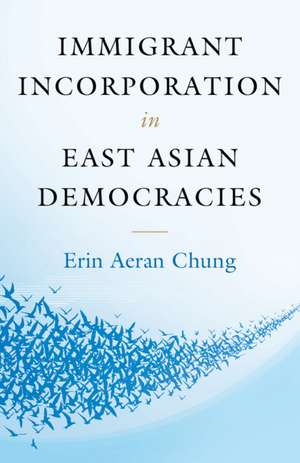Immigrant Incorporation in East Asian Democracies
Autor Erin Aeran Chungen Limba Engleză Paperback – 7 oct 2020
| Toate formatele și edițiile | Preț | Express |
|---|---|---|
| Paperback (1) | 286.13 lei 6-8 săpt. | |
| Cambridge University Press – 7 oct 2020 | 286.13 lei 6-8 săpt. | |
| Hardback (1) | 699.76 lei 6-8 săpt. | |
| Cambridge University Press – 7 oct 2020 | 699.76 lei 6-8 săpt. |
Preț: 286.13 lei
Nou
Puncte Express: 429
Preț estimativ în valută:
54.76€ • 57.02$ • 46.28£
54.76€ • 57.02$ • 46.28£
Carte tipărită la comandă
Livrare economică 11-25 martie
Preluare comenzi: 021 569.72.76
Specificații
ISBN-13: 9781107616967
ISBN-10: 1107616964
Pagini: 270
Dimensiuni: 230 x 155 x 20 mm
Greutate: 0.41 kg
Editura: Cambridge University Press
Colecția Cambridge University Press
Locul publicării:New York, United States
ISBN-10: 1107616964
Pagini: 270
Dimensiuni: 230 x 155 x 20 mm
Greutate: 0.41 kg
Editura: Cambridge University Press
Colecția Cambridge University Press
Locul publicării:New York, United States
Cuprins
Introduction. Is There an East Asian Model of Immigrant Incorporation?; 1. How Civic Legacies Shape Immigration Politics; 2. Constructing Developmental Citizens in East Asia; 3. Civic Legacies and Immigrant Incorporation in East Asian Democracies; 4. 'I Can't Be Tanaka': Understanding Immigrant Incorporation through Migrant Voices; 5. Marriage and Migration; 6. Multiculturalism with Adjectives; Epilogue.
Recenzii
'This pioneering book offers one of the first systematic comparative studies of immigration and citizenship regimes in Japan, South Korea, and Taiwan. Erin Aeran Chung unpacks both the structural similarities among the three cases and their surprising divergences in the 2000s. Chung demonstrates how civil society and preexisting patterns of civic legacies explain how Korea has changed more than Japan, and why Taiwan has liberalized the least. This is a must-read book for students of migration studies and those interested in the politics and societies of Japan, Korea, and Taiwan.' Yves Tiberghien, University of British Columbia
'Going against the grain, Chung's innovative and meticulous analysis reveals the crucial role of civic legacies in shaping inclusionary immigration and citizenship policies for some in East Asia. This brilliant work will spark a major reassessment of our basic assumptions on immigrant integration. A major contribution.' Kamal Sadiq, University of California, Irvine
'Erin Aeran Chung tells a compelling story how the three East Asian democracies, which started from strictly exclusionary policies, have embarked on different pathways of immigrant incorporation. The main protagonist of change is not the state but civil society, and each society's civic legacies determine the trajectory of reform. This book does not merely fill a large gap in the comparative literature, it also provides a powerful analysis of policy change from below that calls for being tested in other cases.' Rainer Bauböck, European University Institute, Florence
'Going against the grain, Chung's innovative and meticulous analysis reveals the crucial role of civic legacies in shaping inclusionary immigration and citizenship policies for some in East Asia. This brilliant work will spark a major reassessment of our basic assumptions on immigrant integration. A major contribution.' Kamal Sadiq, University of California, Irvine
'Erin Aeran Chung tells a compelling story how the three East Asian democracies, which started from strictly exclusionary policies, have embarked on different pathways of immigrant incorporation. The main protagonist of change is not the state but civil society, and each society's civic legacies determine the trajectory of reform. This book does not merely fill a large gap in the comparative literature, it also provides a powerful analysis of policy change from below that calls for being tested in other cases.' Rainer Bauböck, European University Institute, Florence
Notă biografică
Descriere
Comparing three Northeast Asian countries, this book examines how past struggles for democracy shape current movements for immigrant rights.
